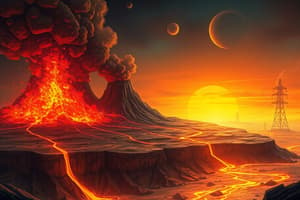Podcast
Questions and Answers
What is the primary process that transforms plant materials into coal?
What is the primary process that transforms plant materials into coal?
- Mineralization
- Carbonization (correct)
- Fermentation
- Photosynthesis
Which statement best describes the relationship between the water content in coal and its energy potential?
Which statement best describes the relationship between the water content in coal and its energy potential?
- The energy potential of coal is independent of its water content.
- Less water means more concentrated carbon and greater energy potential. (correct)
- Higher water content results in higher carbon concentration.
- More water leads to higher energy potential.
Which type of coal is known for containing very little water and having high carbon content?
Which type of coal is known for containing very little water and having high carbon content?
- Black coal (correct)
- Brown coal
- Bituminous coal
- Anthracite coal
What happens to the hydrogen and oxygen content of plant materials as they undergo carbonization?
What happens to the hydrogen and oxygen content of plant materials as they undergo carbonization?
What results from the decomposition of buried plant materials over time?
What results from the decomposition of buried plant materials over time?
Flashcards
Coal Formation
Coal Formation
Coal forms from ancient plant materials that decompose under heat and pressure.
Carbonization
Carbonization
The process where plant material is transformed into coal by increasing carbon content.
Energy Content of Coal
Energy Content of Coal
The energy potential of coal is influenced by its water content; less water means more energy.
Black Coal
Black Coal
Signup and view all the flashcards
Energy Efficiency
Energy Efficiency
Signup and view all the flashcards
Study Notes
Coal Formation
- Coal originates from ancient plant matter (wood and other plants).
- Plant remains are buried, undergoing decomposition.
- Burial depth increases, leading to heat and pressure.
- Chemical changes occur, increasing carbon content and decreasing hydrogen and oxygen.
- This process is termed carbonization.
- Resulting coal is an energy-rich fuel.
Energy Potential of Coal
- Coal's energy potential relates to its water content.
- Lower water content correlates with higher energy density.
- Coal with less water has more concentrated carbon, the main energy source.
- Black coal, with minimal water and high carbon, burns hotter and longer, improving energy efficiency.
Studying That Suits You
Use AI to generate personalized quizzes and flashcards to suit your learning preferences.




